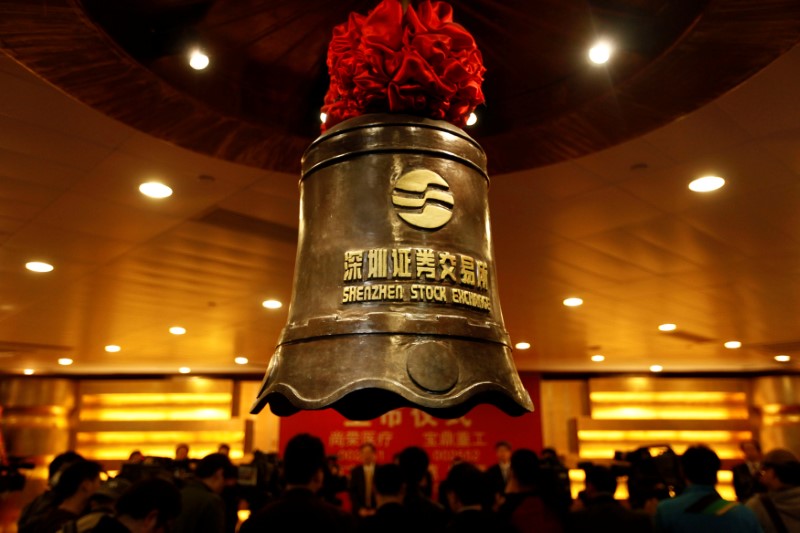By Samuel Shen and Marius Zaharia
SHANGHAI/HONG KONG (Reuters) - Retired chauffeur Yao Huiliang used to spend his days trading small-cap Chinese stocks, trying to make quick money on sharp moves - casino-type behavior often seen in China's stock markets.
But having lost on such bets recently, he is now switching into blue chip stocks, such as the big banks.
"There's not much swing in big-caps, so you don't make quick money. But it's safe," Yao said.
His move is in tune with what regulators in Beijing want to achieve: deflating some of China's asset bubbles and building the global credibility of China's capital markets.
One such bubble, in the eyes of many analysts and investors, is the Shenzhen-based tech-startup-heavy ChiNext, which slumped to its lowest since January 2015 earlier this week following a pledge by Chinese President Xi Jinping to take stronger action to deal with financial risks.
Meanwhile, money flowed into big caps, with the blue-chip CSI300 Index (CSI300) powering to 18-month highs.
Xi's comments were followed by robust economic growth data, which led to speculation that authorities now have enough leeway to tackle bubbles.
Larger investors welcome the switching from small caps into bigger stocks on the Chinese bourses, saying this was a sign that the nation's capital markets were maturing.
Anthony Cragg, senior portfolio manager at Wells Fargo (NYSE:WFC) Asset Management, said the character of China's stock market was changing as domestic investors focused more on whether a company had strong earnings and longer-term growth prospects.
Trading in small caps used to be popular among retail domestic investors, who could make a quick buck by speculating on which firm could become an acquisition target for bigger players or which start-up could become the next unicorn. A unicorn is a start-up whose valuation soars above $1 billion.
"Five years ago, it was very, very speculative. A lot of actions were in fast-moving, speculative stocks with little or no earnings," Cragg said. But, he said, that has changed in the past year with higher quality companies performing better.
"So I think the market has grown up. It has become less of a casino, more of a proper investment market."
OVERVALUED?
After slumping by 5.1 percent on Monday, the ChiNext (CHINEXTP) stabilized around 30-month lows this week. The index is almost 60 percent below a record high hit in June 2015, just before a sharp plunge in China's equity markets.
Yet despite the losses, which contrast with the record highs hit by major stock markets globally, some analysts and investors consider ChiNext shares still overvalued as the index trades at 46 times earnings.
"ChiNext's woe is far from over. I would not be surprised to see this market halve from the current level in two to three years," said Zhou Liang, fund manager at Minority Asset Management Co, who manages assets worth 3.5 billion yuan ($518 million) and has switched into state-owned banks and insurers over the past year.
"With risk-appetite decreasing, investment opportunities in years to come lie in modestly priced blue-chips, rather than those expensive growth stocks."
Investors like Zhou have helped push blue-chip SSE50 (SSE50), dubbed China's "Nifty-Fifty" index, to a two-year high this week. It is trading at a price-to-earnings ratio of 11.6.
The rotation of money into blue-chips should continue, investors say, as Beijing accelerates the opening of its capital market to global investors. U.S. index publisher MSCI will include 222 of China's biggest listed firms in its emerging market benchmark from next June.
Kaiyuan Securities analyst Yang Hai said the anticipation of foreign capital flows is supporting the local investors' behavioral shift: they are now looking more closely at the fundamentals of large, well-known companies that would benefit from a new wall of foreign cash.
CLAMPDOWN
The clampdown by regulators on small-cap speculation is already under way, with authorities forcing some loss-making companies to delist and fining, or even jailing, those found to have manipulated the market.
Yao, the retired chauffeur, was particularly aware of the 5-1/2-year jail sentence slapped on Xu Xiang, a speculator who has earned nicknames such as "Hedge Fund Brother No. 1" and "China's Carl Icahn" in the local media.
Buying interest also cooled after a growing number of high-flying start-ups floundered - most recently ChiNext bellwether Leshi Internet & Information Corp (SZ:300104), whose parent company saw a court freeze some of its assets amid a cash crunch.
Brokerage China Merchants Securities says it expects average earnings growth in ChiNext companies will slow to single-digits from the 25 percent forecast for this year, and says ChiNext "will continue to seek its bottom."
This will be driven by a slowing economy as well as regulators' tighter scrutiny over acquisitions, once a key driver of revenue growth for ChiNext shares, the brokerage said.
Private stock market investor Lu Yahu knows that well and says that in a more tightly regulated slowing economy the stronger companies will get stronger.
"Under such circumstances, the life of small firms is getting difficult," said Lu, who has stopped trading stocks altogether.

($1 = 6.7619 Chinese yuan renminbi)